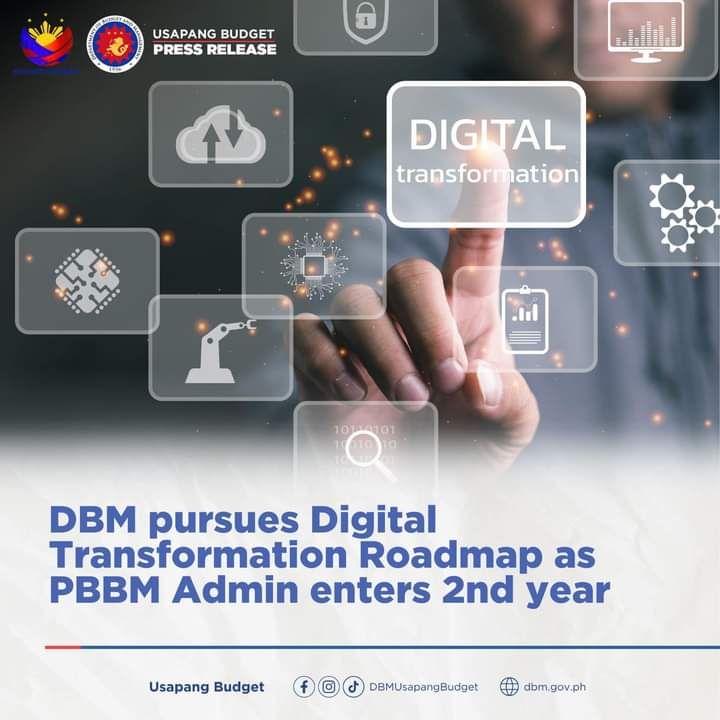DBM PRESS RELEASE
26 July 2023

The Department of Budget and Management (DBM), led by Secretary Amenah F. Pangandaman, fully supports the government’s ongoing digital transformation to enhance bureaucratic efficiency and ensure sound fiscal management, as the administration of President Ferdinand R. Marcos Jr. enters its second year.
For its part, DBM launched its 2022-2026 Digital Transformation Roadmap, or the building of a convergent hub consisting of Application Programming Interfaces (APIs), utilization of GovTech, enabling Digital Tax Bypass, and leveraging Data Engineering and System Integration.
*Financial Management Information System (IFMIS)*
The roadmap has a dual transformation feature: (1) improving current systems used in the Integrated Financial Management Information System (IFMIS), and (2) future-proofing the entire bureaucracy.
Its aims include:
- Create one primary tool and a single source of truth for all fiscal-related transactions;
- Promote fiscal transparency, management, and accountability in government;
- Facilitate faster release of data needed for government transactions;
- Prevent red tape and other corruption-related activities;
- Implement paperless transactions;
- And reduce government expenses on manual transactions.
Executive Order (EO) 29, which the President signed on 01 June 2023, formalized the full adoption of IFMIS in all government agencies.
*Budget and Treasury Management System (BTMS)*
A crucial part of IFMIS is the Budget and Treasury Management System (BTMS), a centralized database that covers all government financial operations, from purchase to payment, and real-time transaction monitoring.
Launched in 2019, temporarily suspended in 2021, and reactivated recently, the BTMS will likewise facilitate financial reports submitted to oversight agencies (DBM, Commission on Audit, Bureau of Treasury).
*Online release of NCA*
On 07 December 2022, DBM signed a Memorandum of Agreement with three authorized government servicing banks — Land Bank of the Philippines, Development Bank of the Philippines, and Philippine Veterans Bank for the implementation of the online release of Notice of Cash Allocations (NCAs), or cash authority issued quarterly by the DBM to central, regional and provincial offices and operating units to cover the cash requirements of government agencies.
The online release of NCAs — done through the DBM’s Action Document Releasing System (ADRS), an online app that facilitates the release of approved DBM action documents directly to authorized users of recipient agencies — will save the government approximately P2.8 million per month, or P33 million annually.
*Project DIME*
DBM is set to relaunch Project DIME (Digital Information for Monitoring and Evaluation), which uses satellites, drones, and geo-tagging in monitoring and evaluate the status of big-ticket government projects. Project DIME is a collaboration with the Philippine Open Government Partnership (PH-OGP), whose members include Civil Society Organizations (CSOs).
*CSO Desk*
DBM’s establishment of the Civil Society Organization (CSO) Desk is a platform that addresses budget-related concerns and inquiries from the public. It will likewise provide capacity-building and training for CSOs on the budget process to enable a more meaningful engagement.
*Modernized PhilGEPS*
To enable full transparency in procurement, DBM has enabled a total e-Government procurement solution. The modernized Philippine Government Electronic Procurement System (mPhilGEPS) employs a system that covers eBidding, eShopping, and eReverse Auction platforms to lessen the procurement workload and to eliminate exposure to corruption of government employees.
DBM’s pursuit of digital transformation — in line with the PBBM Administration’s 8-point Socioeconomic Agenda and the Philippine Development Plan 2023 to 2028 — is part of the strategy to achieve the government’s Agenda for Prosperity that emphasized inclusivity and sustainability even for future generations of Filipinos, with no one left behind.
###

